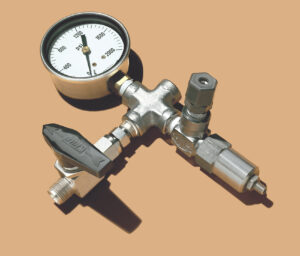Screw air compressors are widely used in industrial applications to provide a continuous and reliable source of compressed air. To ensure efficient operation and prevent potential failures, pressure monitoring is essential. This is where pressure gauges play a critical role.
Importance of Pressure Gauges in Screw Air Compressors
A pressure gauge is a vital component in a screw air compressor, as it allows operators to monitor and control the system’s pressure levels. Proper pressure management ensures optimal performance, energy efficiency, and equipment longevity. The key roles of pressure gauges in screw air compressors include:
- Monitoring System Pressure: The pressure gauge provides real-time pressure readings, helping operators keep the system within safe operating limits.
- Preventing Overloading: Excessive pressure can damage internal components, leading to costly repairs. A pressure gauge allows early detection of pressure build-up.
- Enhancing Energy Efficiency: By maintaining the correct pressure, the compressor operates efficiently, reducing energy consumption and operational costs.
- Ensuring Safety: Abnormal pressure fluctuations can indicate potential issues such as air leaks or blockages. Pressure gauges help identify these problems early.
- Optimizing Performance: Maintaining the correct pressure level ensures that pneumatic tools and machinery connected to the compressor function properly.
Types of Pressure Gauges Used in Screw Air Compressors
Several types of pressure gauges are commonly used in screw air compressors, including:
- Bourdon Tube Pressure Gauges: These are the most widely used and reliable gauges, providing accurate readings for a broad range of pressures.
- Digital Pressure Gauges: These offer precise digital readouts and can be integrated with control systems for automated monitoring.
- Differential Pressure Gauges: These are used to monitor pressure differences between various stages of the compression process.
Placement of Pressure Gauges in Screw Air Compressors
Pressure gauges are strategically placed at key points in a screw air compressor system, such as:
- At the Air End: Measures the pressure generated by the compression process.
- After the Air Receiver Tank: Monitors the final output pressure supplied to the system.
- Before and After Air Filters: Helps detect filter clogging, which can impact compressor efficiency.
Pressure gauges are indispensable for the safe and efficient operation of screw air compressors. By providing accurate pressure readings, they help maintain optimal performance, prevent equipment damage, and ensure workplace safety. Regular monitoring and maintenance of pressure gauges contribute to the longevity and reliability of the compressor system.



